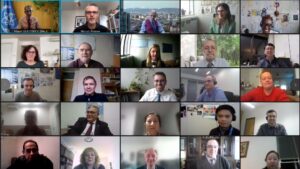 From 18 through 21 October 2021 the 30th Steering Committee Meeting (SCM) of INPRO took place online. The Committee is the governing body that provides guidance to INPRO members on their long-term planning and collaboration on innovations in reactors, fuel cycles and institutional approaches that promote the sustainable development of nuclear energy. INPRO’s membership currently consists of 43 Members – 42 IAEA Member States and the European Commission (EC). Several other countries and international organizations participate as observers in INPRO meetings. This year such observers to the SMC for the first time were ISTC and Uzbekistan. The invitation to ISTC was a sign of growing recognition of the Center’s contribution to nuclear safety in Central Asia, and in Africa. Earlier, in April 2021, ISTC also acquired observer status in another IAEA entity, the Network of Nuclear Security Supports Centers.
From 18 through 21 October 2021 the 30th Steering Committee Meeting (SCM) of INPRO took place online. The Committee is the governing body that provides guidance to INPRO members on their long-term planning and collaboration on innovations in reactors, fuel cycles and institutional approaches that promote the sustainable development of nuclear energy. INPRO’s membership currently consists of 43 Members – 42 IAEA Member States and the European Commission (EC). Several other countries and international organizations participate as observers in INPRO meetings. This year such observers to the SMC for the first time were ISTC and Uzbekistan. The invitation to ISTC was a sign of growing recognition of the Center’s contribution to nuclear safety in Central Asia, and in Africa. Earlier, in April 2021, ISTC also acquired observer status in another IAEA entity, the Network of Nuclear Security Supports Centers.
The agenda of the Steering Committee covered INPRO’s main task areas: global scenarios, innovations, sustainability assessment and strategies, and dialogue and outreach. Using scientific-technical analysis tools, INPRO develops successfully global and regional nuclear energy scenarios to facilitate the transition to sustainable nuclear energy systems. INPRO also supports collaborative projects on innovative reactor concepts, such as the Small Modular Reactors. It encourages increased Member State cooperation in the back-end of the fuel cycle for the sake of nuclear energy sustainability in the future. INPRO’s projects help governments to measure a nuclear energy system’s proliferation resistance, its economic merits, and to demonstrate progress on safety by design.
The Steering Committee endorsed the INPRO Subprogramme Plan, which defines project areas, as well as detailed tasks and priorities for the implementation of activities, including the INPRO Dialogue Forum and various specialized trainings.
As at previous meetings, the 30th SC session offered a platform for mutually beneficial dialogue between countries that have developed nuclear technology and countries that consider using these technologies to build new nuclear energy capacity. A telling example in that regard is the case of Kenya. In his country specific presentation, Joe Mwangi from the Nuclear Power and Energy Agency, reviewed the current progress of Kenya on the infrastructure issues, based on its Nuclear Power Programme. In June 2021 the country received a follow-up IAEA Integrated Nuclear Infrastructure Review (INIR) mission to check the ongoing preparatory works for the construction of a NPP, following the policy decision to that effect.
This year Kenya became the first African country to join ISTC and it intends to use its membership for capacity building projects in the nuclear field.

